荀子劝学双语版教学文稿
《劝学》荀子教案范本
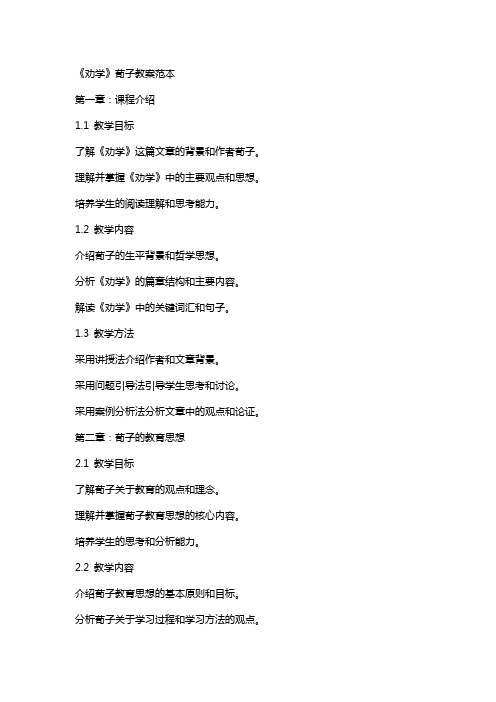
《劝学》荀子教案范本第一章:课程介绍1.1 教学目标了解《劝学》这篇文章的背景和作者荀子。
理解并掌握《劝学》中的主要观点和思想。
培养学生的阅读理解和思考能力。
1.2 教学内容介绍荀子的生平背景和哲学思想。
分析《劝学》的篇章结构和主要内容。
解读《劝学》中的关键词汇和句子。
1.3 教学方法采用讲授法介绍作者和文章背景。
采用问题引导法引导学生思考和讨论。
采用案例分析法分析文章中的观点和论证。
第二章:荀子的教育思想2.1 教学目标了解荀子关于教育的观点和理念。
理解并掌握荀子教育思想的核心内容。
培养学生的思考和分析能力。
2.2 教学内容介绍荀子教育思想的基本原则和目标。
分析荀子关于学习过程和学习方法的观点。
探讨荀子教育思想对现代教育的启示。
2.3 教学方法采用讲授法介绍荀子的教育思想。
采用小组讨论法让学生探讨荀子教育思想的现实意义。
采用案例分析法分析现代教育中存在的问题和解决方案。
第三章:《劝学》的主要观点3.1 教学目标理解并掌握《劝学》中的主要观点和思想。
培养学生的思考和分析能力。
提高学生的阅读理解能力。
3.2 教学内容分析《劝学》中的主要观点和思想。
解读《劝学》中的关键词汇和句子。
探讨《劝学》对个人成长和学习的启示。
3.3 教学方法采用讲授法介绍《劝学》的主要观点。
采用问题引导法引导学生思考和讨论。
采用案例分析法分析文章中的观点和论证。
第四章:《劝学》的论证方法4.1 教学目标理解并掌握《劝学》中的论证方法和逻辑结构。
培养学生的思考和分析能力。
提高学生的阅读理解能力。
4.2 教学内容分析《劝学》中的论证方法和逻辑结构。
解读《劝学》中的论证过程和结论。
探讨《劝学》的论证方法对现代论证的启示。
4.3 教学方法采用讲授法介绍《劝学》的论证方法。
采用问题引导法引导学生思考和讨论。
采用案例分析法分析文章中的论证过程和结论。
5.1 教学目标反思并评价自己的学习过程和效果。
提出改进学习方法和策略的建议。
5.2 教学内容回顾本课程的学习内容和重点。
荀子《劝学》(带重点词句注释)讲课讲稿

荀子《劝学》(带重点词句注释)劝学荀子君子曰:学不可以已(停止)。
青,取之于蓝而青于蓝(青,靛青,一种染料。
蓝,蓼蓝。
蓼(liǎo)蓝:一年生草本植物,茎红紫色,叶子长椭圆形,干时暗蓝色。
花淡红色,穗状花序,结瘦果,黑褐色。
叶子含蓝汁,可以做蓝色染料。
);冰,水为之而寒于水。
木直中绳,輮(通“煣”,用火烤使木条弯曲)以为轮,其曲中规。
虽有槁暴(pù)(有,通“又”。
槁,枯。
暴,同“曝”,晒干。
槁暴,枯干。
),不复挺者,輮使之然也。
故木受绳(用墨线量过)则直,金就砺(磨刀石)则利,君子博学而日参(参,一译检验,检查;二译同“叁”,多次。
)省乎己,则知明(知:通“智”,智慧。
明:明达。
)而行无过矣。
故不登高山,不知天之高也;不临深溪,不知地之厚也;不闻先王之遗言,不知学问之大也。
干、越(春秋时的吴国和越国)、夷、貉(即夷貊,yí mò,古代对东方和北方民族之称。
亦泛指各少数民族)之子,生而同声,长而异俗,教使之然也。
诗曰:“嗟尔君子,无恒安息(不要总是贪图安逸)。
靖共(恭谨地奉守)尔位,好是正直(爱好正直的德行)。
神之听之,介(佐助)尔景(高,大)福。
”神莫大于化道(谓受道的教化,彻悟于道),福莫长于无祸(精神修养没有比受道德熏陶感染更大了,福分没有比无灾无祸更长远了。
)。
吾尝终日而思矣,不如须臾之所学也;吾尝跂(qì,踮起,抬起脚后跟站着)而望矣,不如登高之博见也。
登高而招,臂非加长也,而见者远;顺风而呼,声非加疾也,而闻者彰。
假(借助)舆马者,非利(快)足也,而致千里;假舟楫者,非能水也,而绝(越过)江河。
君子生非异也,善假于物也。
南方有鸟焉,名曰蒙鸠,以羽为巢,而编之以发,系之苇苕(wěi tiáo,芦苇),风至苕折,卵破子死。
巢非不完也,所系者然也。
西方有木焉,名曰射干,茎长四寸,生于高山之上,而临百仞之渊,木茎非能长也,所立者然也。
蓬生麻中,不扶而直;白沙在涅(可做黑色染料的矶石),与之俱黑。
(精品教案)《劝学》讲课稿

(精品教案)《劝学》讲课稿帮大伙儿整理的《劝学》讲课稿,欢迎大伙儿分享。
《劝学》讲课稿1《劝学》则是《荀子》的开篇之作,要紧说述了荀子对学习观的明白。
为啥要挑选这篇呢?首先,荀子是继孔孟之后先秦儒家学派的最终一位代表人物,而且,《劝学》是荀子对学习观的明白,因此放在那个位置,关于差不多熟悉高中学习方式的学生来讲,有一定的教育意义。
高中语文教材大纲要求我们:接着熟悉常见的文言实词的普通用法,了解常见的文言句式,借助工具书阅读浅易的文言文,而本文又是一篇文言文阅读课文,从文体上说,又是一篇典型的总——分式议论文,因此,这篇文章的教学既要担负起积存文言文基础知识的任务,又要把在精读课中学到的知识延伸,能力迁移,形成基本技能的双重任务。
基于此,我确立了本文的教学目标:1、知识目标:(1)掌握重点文言知识,积存文言词汇。
实词如:劝、中、就、假、绝等等,虚词如:而、焉、以、其、之。
(2)掌握比喻论证的办法2、能力目标:(1)培养学生借助注释和工具书阅读浅显文言文,明白重点词句含义,以及初步的研究分析能力。
(2)掌握背诵的技巧。
3、德育目标:了解学习的意义、态度和办法,培养谦虚好学的风气。
依照这些教学目标我确立了本文的重难点:1.文言实虚词的意义和用法。
2.明白比喻的含义及其内在联系。
学生经过前一单元的文言知识的学习和积存,差不多具备了一定的文言基础,而且,我所教授的班级中有大部分学生差不多可以在教师地方拨下较准确地分析文言文的各种特别现象,比如词类活用、句式活用、通假字、古今异义等,因此拟定采纳以学生自读和教师点拨相结合的办法突破重难点。
要紧的教学设想是:1、抓住学生好新好奇的特点,利用幻灯片激发其学习的兴趣,调动学生的非智力因素,使其集中注意力,并激发其学习文言文的兴趣。
2、从教育学的角度来说,以思维训练为中心,经过提咨询、讨论、学生质疑学生答疑、教师点拨的方式饿授课可以充分发挥学生的主体作用,解决文字障碍,并掌握文言知识,特殊是重点实虚词的意义和用法。
劝学荀子讲课稿
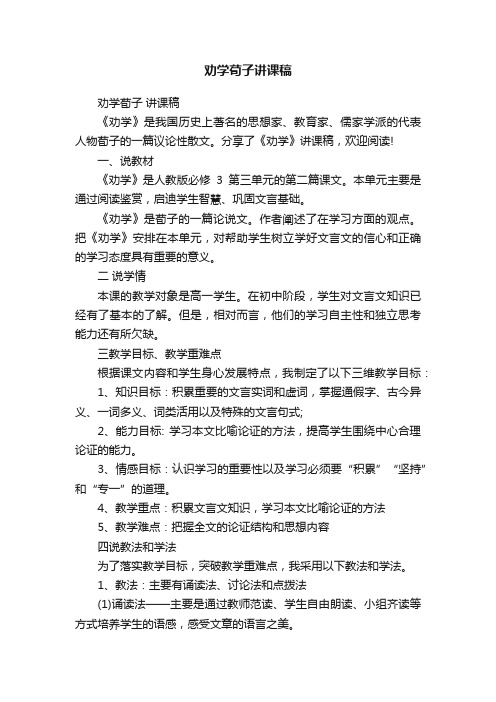
劝学荀子讲课稿劝学荀子讲课稿《劝学》是我国历史上著名的思想家、教育家、儒家学派的代表人物荀子的一篇议论性散文。
分享了《劝学》讲课稿,欢迎阅读!一、说教材《劝学》是人教版必修3第三单元的第二篇课文。
本单元主要是通过阅读鉴赏,启迪学生智慧、巩固文言基础。
《劝学》是荀子的一篇论说文。
作者阐述了在学习方面的观点。
把《劝学》安排在本单元,对帮助学生树立学好文言文的信心和正确的学习态度具有重要的意义。
二说学情本课的教学对象是高一学生。
在初中阶段,学生对文言文知识已经有了基本的了解。
但是,相对而言,他们的学习自主性和独立思考能力还有所欠缺。
三教学目标、教学重难点根据课文内容和学生身心发展特点,我制定了以下三维教学目标:1、知识目标:积累重要的文言实词和虚词,掌握通假字、古今异义、一词多义、词类活用以及特殊的文言句式;2、能力目标: 学习本文比喻论证的方法,提高学生围绕中心合理论证的能力。
3、情感目标:认识学习的重要性以及学习必须要“积累”“坚持”和“专一”的道理。
4、教学重点:积累文言文知识,学习本文比喻论证的方法5、教学难点:把握全文的论证结构和思想内容四说教法和学法为了落实教学目标,突破教学重难点,我采用以下教法和学法。
1、教法:主要有诵读法、讨论法和点拨法(1)诵读法——主要是通过教师范读、学生自由朗读、小组齐读等方式培养学生的语感,感受文章的语言之美。
(2)讨论法——主要是提出问题,通过小组讨论,师生交流,调动学生学习的积极性。
(3)点拨法——对学生提出的难点进行点拨。
2、学法:我根据新课改的要求,引导学生采用自主合作探究的学习方法。
(1)自主学习体现在利用工具书和注释疏通文意的过程中。
(2)合作学习体现在小组讨论的过程中。
(3)探究学习体现在质疑问难,与文本深层次对话的过程中。
五说教学过程下面,我重点说一下本节课的教学过程本节课共有6个学习环节环节一、温故导入激发兴趣我的导语是这样设计的:同学们,历代文人墨客给我们留下了许多关于学习的诗句,你知道哪些呢?然后带领学生一起走近《劝学》,看一看荀子给我们留下了关于学习的什么思考。
劝学的课件完整版课件
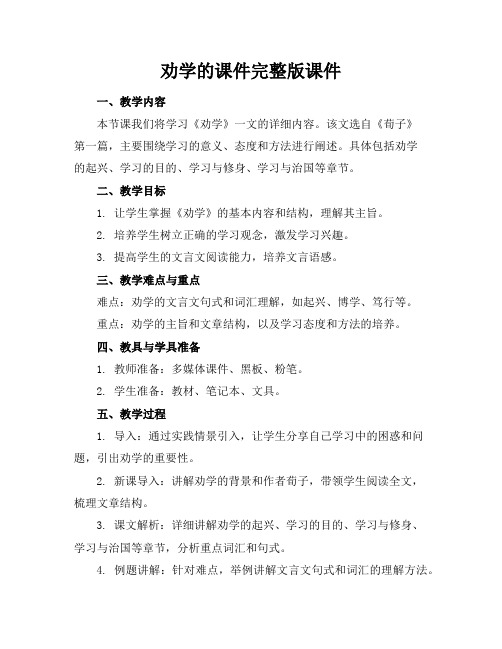
劝学的课件完整版课件一、教学内容本节课我们将学习《劝学》一文的详细内容。
该文选自《荀子》第一篇,主要围绕学习的意义、态度和方法进行阐述。
具体包括劝学的起兴、学习的目的、学习与修身、学习与治国等章节。
二、教学目标1. 让学生掌握《劝学》的基本内容和结构,理解其主旨。
2. 培养学生树立正确的学习观念,激发学习兴趣。
3. 提高学生的文言文阅读能力,培养文言语感。
三、教学难点与重点难点:劝学的文言文句式和词汇理解,如起兴、博学、笃行等。
重点:劝学的主旨和文章结构,以及学习态度和方法的培养。
四、教具与学具准备1. 教师准备:多媒体课件、黑板、粉笔。
2. 学生准备:教材、笔记本、文具。
五、教学过程1. 导入:通过实践情景引入,让学生分享自己学习中的困惑和问题,引出劝学的重要性。
2. 新课导入:讲解劝学的背景和作者荀子,带领学生阅读全文,梳理文章结构。
3. 课文解析:详细讲解劝学的起兴、学习的目的、学习与修身、学习与治国等章节,分析重点词汇和句式。
4. 例题讲解:针对难点,举例讲解文言文句式和词汇的理解方法。
5. 随堂练习:让学生翻译课文中的重点句子,巩固所学知识。
六、板书设计1. 板书《劝学》2. 内容结构:起兴:青取之于蓝,而青于蓝。
学习的目的:博学之、审问之、慎思之、明辨之、笃行之。
学习与修身:学不可以已,君子博学而日参省乎己。
学习与治国:国将兴,必贵师而重傅。
七、作业设计1. 作业题目:翻译课文中的重点句子。
根据劝学的思想,结合自己的学习经历,写一篇心得体会。
作业答案:略八、课后反思及拓展延伸本节课通过实践情景引入、例题讲解和随堂练习,使学生较好地掌握了《劝学》的基本内容和结构。
在课后反思中,教师应关注学生的学习反馈,针对学生的疑问和困难进行个别辅导。
同时,鼓励学生课后阅读相关文言文作品,提高文言文阅读能力,拓展知识面。
拓展延伸方面,可以让学生探讨劝学的现代意义,如何在学习、工作和生活中践行劝学的思想。
英语作文介绍荀子的劝学文章

英语作文介绍荀子的劝学文章English: In Xunzi's essay "Encouraging Learning," he emphasizes the importance of education and learning in human development. He argues that human nature is inherently selfish and ignorant, and it is through learning and education that individuals can cultivate their moral character and become virtuous members of society. Xunzi believes that only through continuous learning and self-improvement can individuals overcome their innate selfishness and ignorance, and ultimately achieve personal growth and contribute positively to the world. He encourages people to embrace education and to constantly seek knowledge in order to better themselves and make meaningful contributions to society.中文翻译: 在荀子的《劝学》一文中,他强调教育和学习对人类发展的重要性。
他认为人的天性本质是自私和无知的,只有通过学习和教育,个体才能培养其道德品格,成为社会上有德行的成员。
荀子认为只有通过持续学习和自我完善,个体才能克服其先天的自私和无知,最终实现个人成长并积极为世界做出贡献。
劝学原文及翻译课件

劝学原文解析
1 2
解析点1
《劝学》开篇即点明学习的重要性,认为学习 可以提升个人修养和治理国家的能力。
解析点2
文章通过正反对比论证,阐述了学习的意义和 作用,鼓励人们不断学习。
3
解析点3
荀子提出学习的关键在于“博学”和“日参省 乎己”,即广泛学习和自我反省。
劝学原文的创作背景
背景介绍
01
荀子所处的时代是战国时期,当时诸侯割据、战争不断,社会
被动语态与主动语态
被动语态
将句子中的主语和谓语动词的顺序互换,表达动作的承受者 。
主动语态
表达动作的执行者,主语是动作的发起者。
词义选择与句式调整
词义选择
根据上下文和语境选择合适的词汇来表达原文的意思。
句式调整
根据目标语言的语法结构和表达习惯,对原文的句式进行适当的调整,使其 更加流畅易懂。
03
Байду номын сангаас
英译汉翻译实例
总结词
忠实、流畅、易懂
详细描述
英译汉翻译实践中,应该注重忠实原文、流畅表达和 易于理解。在忠实原文方面,需要准确把握原文的意 思和意图,尊重原文的语法结构和修辞手法。同时, 在流畅表达方面,需要运用汉语的语法结构和表达习 惯,注重语言的节奏感和韵律感。最后,为了使译文 易于理解,需要避免使用过于生僻的词汇和语法结构 ,尽可能使用简单明了的语言表达原文的意思。
语言变体与翻译
01
语言变体
由于地域、社会、年龄、性别、语体等因素,语言会呈现出不同的变
体。
02
翻译中对语言变体的处理
在翻译中需要考虑原文和目标语言之间的语言变体,尽可能保持原文
的特色和风格,同时也要符合目标语言的表达习惯。
劝学教案模板小学英语学习

课时:2课时年级:四年级教学目标:1. 让学生了解英语学习的重要性,激发他们对英语学习的兴趣。
2. 培养学生良好的学习习惯,提高英语学习效率。
3. 培养学生的团队合作精神,让学生在英语学习中互相帮助、共同进步。
教学重点:1. 让学生认识到英语学习的重要性。
2. 培养学生良好的学习习惯。
教学难点:1. 如何激发学生对英语学习的兴趣。
2. 如何培养学生的团队合作精神。
教学过程:第一课时:一、导入1. 教师展示一些图片,如国旗、地球、各国风景等,引导学生思考:为什么我们要学习英语?2. 学生自由发言,教师总结:学习英语可以让我们更好地了解世界,拓宽视野。
二、新课导入1. 教师播放一段关于英语学习的视频,让学生了解英语学习的方法和技巧。
2. 学生观看视频,教师提问:视频中提到了哪些学习方法?你有什么感受?三、小组讨论1. 将学生分成小组,讨论以下问题:(1)你认为学习英语有什么好处?(2)你有什么好的学习英语的方法?2. 各小组派代表发言,分享讨论成果。
四、实践环节1. 教师带领学生进行一些简单的英语游戏,如“猜谜语”、“你说我猜”等,让学生在游戏中学习英语。
2. 学生积极参与游戏,教师点评。
五、总结1. 教师总结本节课的学习内容,强调英语学习的重要性。
2. 学生分享自己的学习心得,教师点评。
第二课时:一、复习1. 教师带领学生复习上一节课学习的内容,检查学生对英语学习的认识。
2. 学生回答问题,教师点评。
二、新课导入1. 教师展示一些关于英语学习的名言警句,如“熟能生巧”、“持之以恒”等,引导学生思考如何培养良好的学习习惯。
2. 学生自由发言,教师总结:良好的学习习惯是学习英语的关键。
三、小组讨论1. 将学生分成小组,讨论以下问题:(1)你认为良好的学习习惯有哪些?(2)如何培养良好的学习习惯?2. 各小组派代表发言,分享讨论成果。
四、实践环节1. 教师带领学生进行一些关于培养良好学习习惯的活动,如“时间管理”、“阅读计划”等。
2021年荀子劝学教案设计范文

荀子劝学教案设计范文导语:《劝学》是《荀子》一书的首篇。
又名《劝学篇》。
劝学,就是鼓励学习。
本篇较系统地论述了学习的理论和方法。
前一部分(第一段),论述学习的重要性;后一部分(第二、三段),论述学习的步骤、内容、途径等有关问题。
一、教学理念为了激发学生兴趣,完成《劝学》的教学目标,我采用逐层剥笋的方法,分别从解读内涵、探求手段、 ___应用三个层次来引导学生,不仅分析了学习的意义、作用、态度,而且从议论文写作角度认识了喻证法的精妙之处;利用知识、能力、情感三个基点来讲述课文,同时结合学生的自主发挥和多媒体应用去完成本节课的教学。
二、任务分析课文分析:本文是苏教版高中语文必修一第二专题“获得教养的途径”中的第一篇,本专题强调了人类走向理性获得教养的重要途径就是读书。
本文的教学也将紧紧围绕这一主题,激发学生思考读书的作用和学习的基本原则。
要求学生积累文言知识,引导学生深刻理解语句逻辑。
《劝学》主要阐述了学习的重要性,并进一步论述了正确的学习方法和学习态度。
本文在语言上善于运用比喻、排比、对偶。
文辞流畅节奏感强。
文章结构严谨,说理透彻,有很强的逻辑性学生分析:学生需要掌握“劝”等实词和“于”等虚词的用法,理清文章结构。
高一的学生经过初中三年的学习,已经具备了一定的文言文鉴赏能力。
但对于本文多角度的论证方法的掌握上有一定困难。
因此引导学生运用“诵读涵泳法”、“提问探究”多种自主学习的方法来学习课文。
本文将花2课时上完。
三、目标阐明知识与能力1、学生需要掌握“劝”等实词和“于”等虚词的用法。
2、说出文中对比说理的方法和效果,解释文中的比喻句。
3、背诵并默写过程与方法1、正确掌握诵读的方法2、在积累的过程中运用查阅字典法情感态度与价值观1、体会学习的重要性2、说出文章中论证得出的学习的方法和态度是什么。
教学重难点教学重点:1、掌握“劝”等实词和“于”等虚词的用法 2、说出文章中论证得出的学习的方法和态度是什么教学难点:1、文中对比说理的方法和效果,解释文中的比喻句四、过程设计(第一课时)初读课文,整体感知:首先,由学生谈谈对荀子的了解,老师补充。
劝学-教案12页
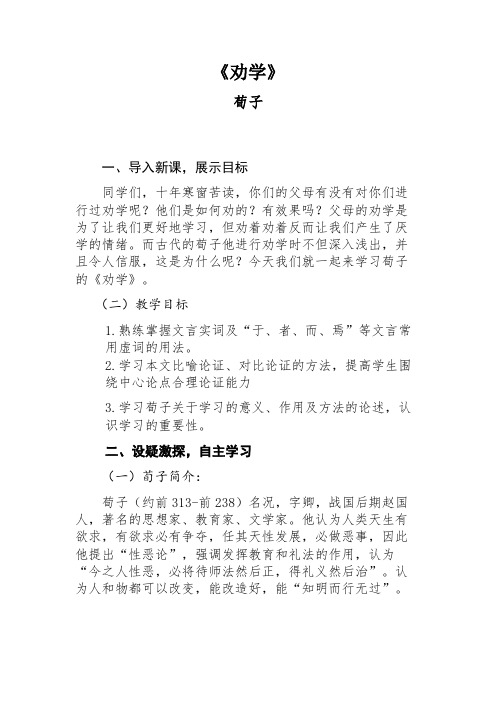
《劝学》荀子一、导入新课,展示目标同学们,十年寒窗苦读,你们的父母有没有对你们进行过劝学呢?他们是如何劝的?有效果吗?父母的劝学是为了让我们更好地学习,但劝着劝着反而让我们产生了厌学的情绪。
而古代的荀子他进行劝学时不但深入浅出,并且令人信服,这是为什么呢?今天我们就一起来学习荀子的《劝学》。
(二)教学目标1.熟练掌握文言实词及“于、者、而、焉”等文言常用虚词的用法。
2.学习本文比喻论证、对比论证的方法,提高学生围绕中心论点合理论证能力3.学习荀子关于学习的意义、作用及方法的论述,认识学习的重要性。
二、设疑激探,自主学习(一)荀子简介:荀子(约前313-前238)名况,字卿,战国后期赵国人,著名的思想家、教育家、文学家。
他认为人类天生有欲求,有欲求必有争夺,任其天性发展,必做恶事,因此他提出“性恶论”,强调发挥教育和礼法的作用,认为“今之人性恶,必将待师法然后正,得礼义然后治”。
认为人和物都可以改变,能改造好,能“知明而行无过”。
他是先秦儒家最后的代表,朴素唯物主义思想集大成者。
韩非和李斯都是他的学生。
他强调教育和礼法的作用,主张治理天下既要靠“法制”,又要重视教化兼用“礼”治,强调“行”对于“知”的必要性和后天学习的重要性,认为后天环境和教育可以改变人的本性。
荀子的著作有《荀子》二十卷。
该书由《论语》、《孟子》的语录体,发展为有标题的论文,标志着古代说理文的进一步成熟。
他的散文说理透彻、语言质朴、多排比句,又善用比喻。
《劝学》是《荀子》的第一篇。
本文是原文前几段的节录。
(二)解题1.“劝”起着统领全篇的作用。
“劝”是什么意思?2.“劝”的繁体字“勸”是形声字,凡是用“力”作声旁的字,多数有给人们勉励的意思,如“励”、“努”。
在现代汉语中,“劝”,一般解释为“劝阻”,词义已经转移了。
3. 作者在这篇以《劝学》为题目的文章中,勉励人们要不停止地坚持学习,只有这样才能增长知识,发展才能,培养高尚的品德。
《劝学》教案汇总八篇
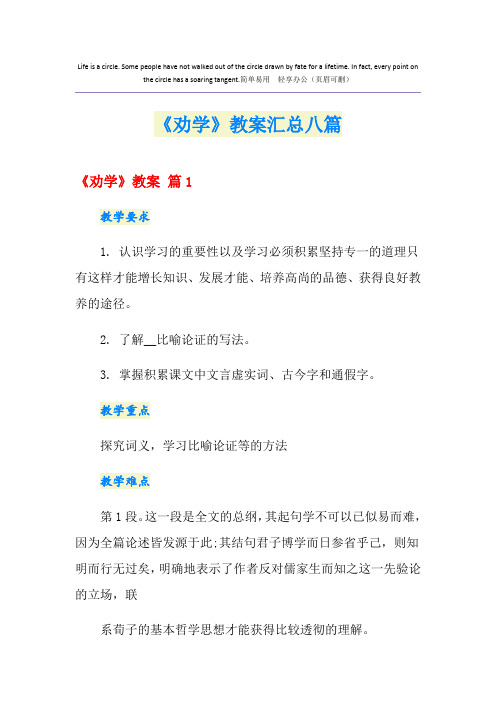
Life is a circle. Some people have not walked out of the circle drawn by fate for a lifetime. In fact, every point on the circle has a soaring tangent.简单易用轻享办公(页眉可删)《劝学》教案汇总八篇《劝学》教案篇1教学要求1. 认识学习的重要性以及学习必须积累坚持专一的道理只有这样才能增长知识、发展才能、培养高尚的品德、获得良好教养的途径。
2. 了解__比喻论证的写法。
3. 掌握积累课文中文言虚实词、古今字和通假字。
教学重点探究词义,学习比喻论证等的方法教学难点第1段。
这一段是全文的总纲,其起句学不可以已似易而难,因为全篇论述皆发源于此;其结句君子博学而日参省乎己,则知明而行无过矣,明确地表示了作者反对儒家生而知之这一先验论的立场,联系荀子的基本哲学思想才能获得比较透彻的理解。
教学过程:1. 新课导入同学们,也许我们有的同学不能真正理解学习的重要性;也许我们有的同学整天或冥思苦想,或埋头看书,但效果不佳,因而苦愁没有一个好的学习方法。
今天我们学习荀子的《劝学》,它将告诉我们学习的意义和作用,告诉我们学习的方法和应有的态度,希望大家能有所借鉴。
2. 解题(1)《劝学》的劝起着统领全篇的作用。
教师先在黑板上写一个劝字,问道:这个字是什么意思?学生往往会不假思索地回答:劝告。
教者趁此在劝字后加上一个学,再问:劝是什么意思?学生才会领悟:原来它还有劝勉的意思。
为什么要劝学?(2)作者介绍荀子(约公元前313前238)名况字卿,战国末期赵国人,曾游学于齐,当过楚国兰陵令。
后来失官居家著书,死后葬于兰陵。
荀子是我国古代的思想家、教育家、是先秦儒家最后的代表,朴素唯物主义思想集大成者。
韩非和李斯都是他的学生。
他反对迷信天命鬼神,肯定自然规律是不以人们意志为转移的,并提出制天命而用之的人定胜天的思想。
劝学教学讲稿范文

劝学教学讲稿范文劝学教学讲稿范本这是一篇说理性很强的文章,让我们很容易想到古代的老学究,穿着灰色长袍,正襟危坐,拖着长腔,讲着一堆枯燥、乏味、单调的大道理时的情形。
这篇文章是这样吗。
以下是为大家整理劝学教学讲稿范本参考资料,提供参考,欢迎你的阅读。
劝学教学讲稿范本一【教学目标】1.了解荀子有关学习的意义,作用和学习应持态度的论述。
2.掌握本文的论证方法:比喻论证、正反对比论证。
【教学重点】了解荀子有关学习的意义,作用和学习应持态度的论述。
【教学难点】掌握本文的论证方法:比喻论证、正反对比论证。
【教学步骤】一、导语同学们,在我们的学习过程中,是否总有些困惑?有人说,我整天冥思苦想,埋头看书,但是效果不佳;有人说,我上课真的是认真听讲了,也觉得听懂了,但是一做题就不会了;有人说,我认真努力地学习了,付出了,可考试总是成绩平平。
我们也曾是雄心勃勃,也想卧薪尝胆,也想破釜沉舟,但面对现实中的自己又总是有些无奈。
今天,让我们走进荀子,走进他的《劝学》,希望这位睿智的思想家、教育家,能帮助我们走出困惑,给我们指明一条前行的路。
二、解题劝,劝勉,鼓励。
学,学习。
三、分析^p 课文(一)分析^p 第一段:1.我们已经粗略地翻译完了这篇课文,大家思考:本文的中心论点是什么?(生答:学不可以已,学习是不能够停止的。
)2.从这篇文章的中心论点看,这是一篇说理性很强的文章,让我们很容易想到古代的老学究,穿着灰色长袍,正襟危坐,拖着长腔,讲着一堆枯燥、乏味、单调的大道理时的情形。
这篇文章是这样吗?(二)让我们分析^p 第二段(学生齐读,老师纠正读音)。
1.大家思考:本段一共有几个比喻句?(学生回答:五个)请读出并翻译前两个。
(青,取之于蓝,而青于蓝;冰,水为之,而寒于水。
靛青是从蓼蓝中提取,却比蓼蓝的颜色更深;冰是由水凝结成的,却比水温度低得多)经过提取的过程,靛青不再是蓼蓝的颜色,经过凝结的过程,冰的寒冷也不同于水,说明经过某种人为或自然的变化过程,事物可以改变原有的性质。
劝学荀子课件范文
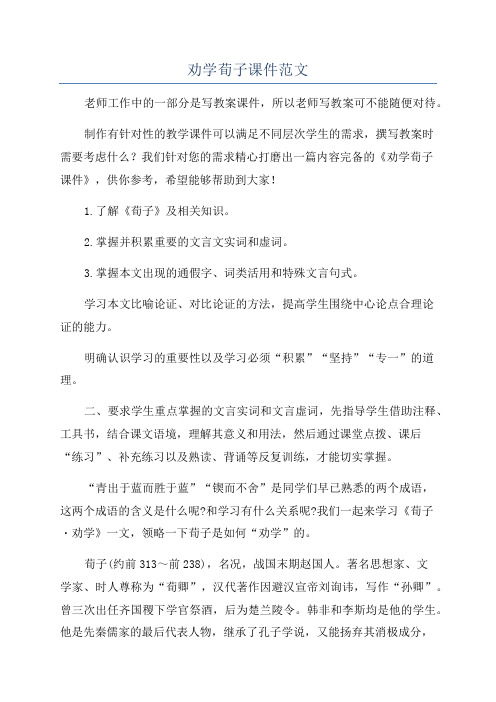
劝学荀子课件范文老师工作中的一部分是写教案课件,所以老师写教案可不能随便对待。
制作有针对性的教学课件可以满足不同层次学生的需求,撰写教案时需要考虑什么?我们针对您的需求精心打磨出一篇内容完备的《劝学荀子课件》,供你参考,希望能够帮助到大家!1.了解《荀子》及相关知识。
2.掌握并积累重要的文言文实词和虚词。
3.掌握本文出现的通假字、词类活用和特殊文言句式。
学习本文比喻论证、对比论证的方法,提高学生围绕中心论点合理论证的能力。
明确认识学习的重要性以及学习必须“积累”“坚持”“专一”的道理。
二、要求学生重点掌握的文言实词和文言虚词,先指导学生借助注释、工具书,结合课文语境,理解其意义和用法,然后通过课堂点拨、课后“练习”、补充练习以及熟读、背诵等反复训练,才能切实掌握。
“青出于蓝而胜于蓝”“锲而不舍”是同学们早已熟悉的两个成语,这两个成语的含义是什么呢?和学习有什么关系呢?我们一起来学习《荀子・劝学》一文,领略一下荀子是如何“劝学”的。
荀子(约前313~前238),名况,战国末期赵国人。
著名思想家、文学家、时人尊称为“荀卿”,汉代著作因避汉宣帝刘询讳,写作“孙卿”。
曾三次出任齐国稷下学官祭酒,后为楚兰陵令。
韩非和李斯均是他的学生。
他是先秦儒家的最后代表人物,继承了孔子学说,又能扬弃其消极成分,并批判吸收各学派的思想学说,成为先秦朴素唯物主义思想的代表人物。
其散文说理透彻,气势雄浑,语言质朴,句法简练缜密,多排比,善譬喻。
《荀子》一书共32篇,其中26篇为荀子所著,末6篇或为其门人弟子所记。
该书由《论语》、《孟子》的语录体,发展为有标题的论文,标志着古代说理文的进一步成熟。
他的散文说理透彻、语言质朴、多排比句,又善用比喻。
《劝学》是《荀子》的第一篇。
本文是原文前几段的节录。
《劝学》是《荀子》第一篇,“劝”是“劝勉”的意思。
《劝学》论述了学习的意义、作用、方法和态度,反映了先秦儒家在教育方面的一些正确观点,也体现了作为先秦诸子思想集大成者的荀子文章的艺术风格。
- 1、下载文档前请自行甄别文档内容的完整性,平台不提供额外的编辑、内容补充、找答案等附加服务。
- 2、"仅部分预览"的文档,不可在线预览部分如存在完整性等问题,可反馈申请退款(可完整预览的文档不适用该条件!)。
- 3、如文档侵犯您的权益,请联系客服反馈,我们会尽快为您处理(人工客服工作时间:9:00-18:30)。
荀子劝学双语版荀子-劝学篇-英文版荀子Hsun-TzuTranslated by Burton Watson劝学篇第一ENCOURAGING, LEARNING (SECTION 1)君子曰:学不可以已。
青、取之於蓝,而青於蓝;冰、水为之,而寒於水。
木直中绳,輮以为轮,其曲中规,虽有槁暴,不复挺者,輮使之然也。
故木受绳则直,金就砺则利,君子博学而日参省乎己,则知明而行无过矣。
The gentleman says: Learning should never cease. Blue comes from the indigo plant but is bluer than the plant itself. Ice is made of water but is colder than water ever is…. If the gentleman studies widely and each day examines himself, his wisdom will become clear and his conduct be without fault.故不登高山,不知天之高也;不临深溪,不知地之厚也;不闻先王之遗言,不知学问之大也。
干、越、夷、貉之子,生而同声,长而异俗,教使之然也。
诗曰:「嗟尔君子,无恒安息。
靖共尔位,好是正直。
神之听之,介尔景福。
」神莫大於化道,福莫长於无祸。
If you do not climb a high mountain, you will not comprehend the highness of the heavens; if you do not look down into a deep valley, you will not know the depth of the earth; and if you do not hear the words handed down from the ancient kings, you will not understand the greatness of learning. Children born among the Han or Yüeh people of the south and among the Mo barbarians of the north cry with the same voice at birth, but as they grow older they follow different customs. Education causes them to differ. The Odes says: Oh, you gentlemen, do not be constantly at ease and rest! Quietly respectful in your posts, love those who are correct and upright And the gods will hearken to youAnd aid you with great blessing.1There is no greater godliness2 than to transform yourself with the Way, no greater blessing than to escape misfortune.吾尝终日而思矣,不如须臾之所学也。
吾尝跂而望矣,不如登高之博见也。
登高而招,臂非加长也,而见者远;顺风而呼,声非加疾也,而闻者彰。
假舆马者,非利足也,而致千里;假舟楫者,非能水也,而绝江河。
君子生非异也,善假於物也。
I once tried spending the whole day in thought, but I found it of less value than a moment of study.3 I once tried standing on tiptoe and gazing into the distance, but I found I could see much farther by climbing to a high place. If you climb to a high place and wave to someone, it is not as though your arm were any longer than usual, and yet people can see. you from much farther away. If you shout down the wind, it is not as though your voice were any stronger than usual, and yet people can hear you much more clearly. Those who make use of carriages or horses may not be any faster walkers than anyone else, and yet they are able to travel a thousand li. Those who make use of boats may not know how to swim, and yet they manage to get across rivers. The gentleman is by birth no different from any other man; it is just that he is good at making use of things.南方有鸟焉,名曰蒙鸠,以羽为巢,而编之以发,系之苇苕,风至苕折,卵破子死。
巢非不完也,所系者然也。
西方有木焉,名曰射干,茎长四寸,生於高山之上,而临百仞之渊,木茎非能长也,所立者然也。
蓬生麻中,不扶而直;白沙在涅,与之俱黑。
兰槐之根是为芷,其渐之滫,君子不近,庶人不服。
其质非不美也,所渐者然也。
故君子居必择乡,游必就士,所以防邪辟而近中正也。
In the south there is a bird called the meng dove. It makes a nest out of feathers woven together with hair and suspends it from the tips of the reeds. But when the wind comes, the reeds break, the eggs are smashed, and the baby birds killed. It is not that the nest itself is faulty; the fault is in the thing it is attached to. In the west there is a tree called the yeh-kan. Its trunk is no more than four inches tall and it grows on top of the high mountains, from whence it looks down into valleys a hundred fathoms deep. It is not a long trunk which afford the tree such a view, but simply the place where it stands. If pigweed grows up in the midst of hemp, it will stand up straight without propping. If white sand is mixed with mud, it too will turn black.4 The root of a certain orchid is the source of the perfume called chih; but if the root were to be soaked in urine, then no gentleman would go near it and no commoner would consent to wear it. It is not that the root itself is of an unpleasant quality; it is the fault of the thing it has been soaked in. Therefore a gentleman will take care in selecting the community he intends to live in, and will choose men of breeding for his companions. In this way he wards off evil and meanness, and draws close to fairness and right.物类之起,必有所始。
荣辱之来,必象其德。
肉腐出虫,鱼枯生蠹。
怠慢忘身,祸灾乃作。
强自取柱,柔自取束。
邪秽在身,怨之所构。
施薪若一,火就燥也,平地若一,水就湿也。
草木畴生,禽兽群居,物各从其类也。
是故质的张而弓矢至焉;林木茂而斧斤至焉;树成荫,而众鸟息焉。
醯酸而蟥聚焉。
故言有招祸也,行有招辱也,君子慎其所立乎!Every phenomenon that appears must have a cause. The glory or shame that come to a man are no more than the image of his virtue. Meat when it rots breeds worms; fish that is old and dry brings forth maggots. When a man is careless and lazy and forgets himself, that is when disaster occurs. The strong naturally bear up under weight; the weak naturally end up bound.5 Evil and corruption in oneself invite the anger of others. If you lay sticks of identical shape on a fire, the flames will seek out the driest ones; if you level the ground to an equal smoothness, water will still seek out the dampest spot. Trees of the same species grow together; birds and beasts gather in herds; for all things follow after their own kind. Where a target is hung up, arrows will find their way to it; where the forest trees grow thickest, the axes will enter. When a tree is tall and shady, birds will flock to roost in it; when vinegar turns sour, gnats will collect around it. So there are words that invite disaster and actions that call down shame. A gentleman must be careful where he takes his stand.积土成山,风雨兴焉;积水成渊,蛟龙生焉;积善成德,而神明自得,圣心备焉。
